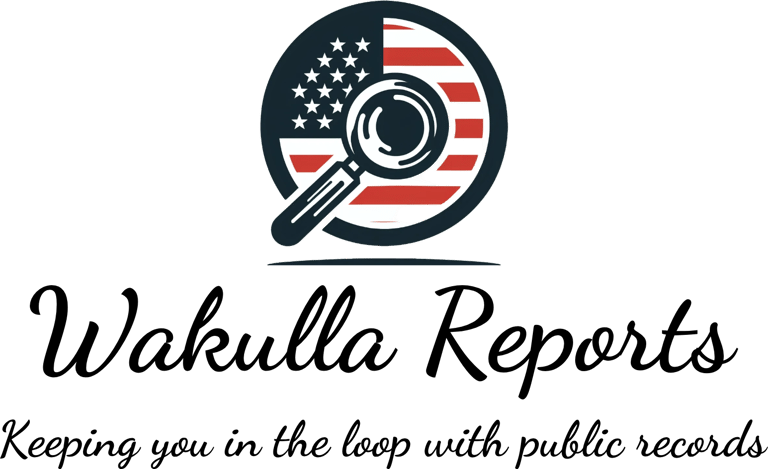BOCC July 14, 2025 Meeting - 🏗️ Item #12 & 13 - Housing Programs: Bureaucratic Hot Potato or Strategic Elevation?
Wakulla County's State Housing Initiative Partnership (SHIP) program administration has passed through more hands than a football in a trick-play offense
MONEY & FINANCEWAKULLA BOCC MEETINGS
Ida B. Wells
7/11/20254 min read


🎭 Items #12 and #13 of the July 2025 agenda pull back the curtain on this civic sleight-of-hand.
We’re talking about the State Housing Initiative Partnership (SHIP) and the Community Development Block Grant (CDBG) programs — both critical lifelines for vulnerable residents. But behind the paperwork lies a maze of acquisitions and nameplate swaps that make tracking accountability nearly impossible for the public.
These items all contractual obligations to Accenture for administering housing and mortgage aid programs. No budget impact, no program changes—just a fancy nameplate swap and a few new addresses.
A private entity is administering millions in public housing funds. The contractors original relationship with the county dates back +/- 14 years.
Program duties range from applicant screening to managing renovations, all the way to preparing financial reports for the state.
Wakulla’s oversight now involves a corporation with global reach, not a local vendor with regional familiarity.
If housing programs are designed to serve the community, what happens when their administration ends up in the hands of Fortune 500 mergers? Wakulla County’s housing programs began as a modest partnership with a local vendor. But over the years, it's evolved through corporate acquisitions like a nesting doll of LLCs—culminating in Accenture Infrastructure & Capital Projects, LLC, an arm of one of the world’s largest consulting firms.
Here’s where the civic magnifying glass should hover:
· Who owns these contracting firms—especially as they leapfrog into global entities?
· What benefits do these corporate partners gain from administering public aid?
· How does this shift affect transparency, accountability, and local engagement?
The assignment looks routine. But when a housing contract born in 2011 migrates into a multibillion-dollar conglomerate, we have to ask: Are these services still rooted in community care, or has affordable housing become another asset in a consultant’s portfolio?
Wakulla County's State Housing Initiative Partnership (SHIP) program administration has passed through more hands than a football in a trick-play offense:
🏁 Started with Meridian Community Services Group, Inc. in 2011 (Sheets was a player here too)
👉 Became Government Services Group, Inc.
🏦 Got acquired by Anser Advisory, LLC
🏢 And now it's Accenture Infrastructure & Capital Projects, LLC holding the baton
🧾 Founding Details for Government Services Group:
Incorporation Date: December 1996
Registered Agent: Virginia S. Delegal, who worked for NG&N and is now President of the Florida Association of Counties (FAC)
Initial Board Members:
Robert L. Nabors
George H. Nickerson
Thomas Giblin
Duncan Rose
Robert E. Sheets
Three of those names—Nabors, Giblin, and Nickerson—were principals of NG&N and remained on the board until at least 2004. That’s nearly a decade of dual roles in both legal representation and corporate governance.
🕵️♀️ Why It Matters:
GSG (now part of Accenture) was contracted by Wakulla County for grant administration.
The overlap between legal counsel and grant administration raises questions about conflict of interest, influence, and transparency.
And just to add a twist: Heather Encinosa, Wakulla’s current County Attorney, is a shareholder in NG&N and was listed as a registered agent for GSG in later filings.
This isn’t just a paper trail—it’s a civic family tree with roots in both policy and procurement.
Heather’s role as Wakulla County’s Attorney includes:
Drafting ordinances, resolutions, and contracts
Advising on procurement, land use, and constitutional law
Representing Wakulla in litigation, finance, and environmental matters
She's also served as County Attorney for Jefferson County, interim attorney for Levy County, and lead counsel to the Florida Governmental Utility Authority. Basically, she’s the legal Swiss Army knife for small counties with big civic ambitions.
🔄 Contract Evolution: The SHIP Saga Timeline
2011: Meridian awarded the SHIP contract after an RFP process.
Post-2011: Meridian becomes Government Services Group, Inc. (GSG).
2023: GSG acquired by Anser Advisory, LLC, and re-assigned via Board approval.
2025: Anser gets acquired by Accenture, triggering another assignment (that’s Item #12).
Each shift comes with a clean transfer of duties, indemnifications, and rebranded contact details.
This means the administration of millions in housing funds—meant to serve Wakulla—now rests with a multinational firm known more for advising Fortune 500s than coordinating home repair inspections in rural Florida.
🕵️♂️ But Here’s What Wakulla Residents Deserve to Know:
🧱 1. Who Built This House of Contracts?
The original contract wasn’t just born in an RFP—it was incorporated by Nabors, Giblin & Nickerson, P.A., Wakulla’s current legal counsel.
This firm had three of its principals on GSG’s board for nearly a decade.
Heather Encinosa, Wakulla’s current County Attorney, is a shareholder in NG&N and was once the registered agent for GSG.
🔄 2. Who Approved the Mergers & Transfers?
Each corporate acquisition required Board approval.
The narrative always stresses “no change in services,” but never unpacks how scale and accountability shift when local contracts climb the ladder to conglomerates.
💼 3. Who Benefits From This Setup?
Private entities, like Accenture, now have access to grant administration, applicant data, and program oversight previously managed locally.
A contract once executed with neighborhood familiarity is now part of a global portfolio.
Legal and administrative figures connected to the contract from its inception remain engaged at every stage.
📜 How Transparent Was This Process?
Public discussion on these transitions has been minimal.
Each agenda item reads like clerical procedure—even though the underlying reality involves multiple organizational shifts, legal overlap, and potential conflicts of interest.
🏦 5. What Happens to Local Oversight?
The further removed the vendor, the less direct accountability.
Wakulla residents lose the thread—and gain a consultant who likely doesn’t know their zip code, but can churn out KPI dashboards faster than emergency housing repairs.
🧠 Civic Questions We Can’t Ignore
How many housing programs now sit within Accenture’s portfolio — and who audits their performance locally?
Why are assignments treated as formality, while vendor control shifts dramatically?
Do local governments owe residents an RFP process after corporate acquisitions?
How does legal familiarity shape vendor loyalty — and does it weaken fair competition?
“When Consultants Morph Into Conglomerates: Wakulla’s Housing Contracts Need More Than Passive Consent”
Item #12 and Item #13 aren’t just routine agenda fodder — they’re case studies in how housing equity can be corporatized quietly. Each merger, each assignment, and each sheet of indemnification paperwork represents a layer between Wakulla’s residents and the programs meant to serve them.
The role of NG&N is too woven into the vendor’s DNA to ignore. The assignment to Accenture — a consultancy known for international infrastructure deals — signals more than convenience: it reflects a slow erasure of community voice.
And while the County touts “no budget impact,” it’s worth asking:
If residents don’t know who holds their housing data, how can they demand accountability when services fall short? Is there any history where it has fallen short?
Transparency isn’t just about showing your work — it’s about letting the public see who’s working. Wakulla Reports will keep showing receipts. Stay sharp, Wakulla!

Additional Social Links
YouTube is your go-to for short clips, video explainers, and visual breakdowns of how Florida and Wakulla governments really work.
Facebook brings you bite-sized written content, sticky-note facts, and rolling updates you can share and discuss.
Prefer to browse at your own pace?
Bookmark our website and visit anytime for fresh posts, resources, and real-life examples from right here in Wakulla County.
© 2024. All rights reserved.
